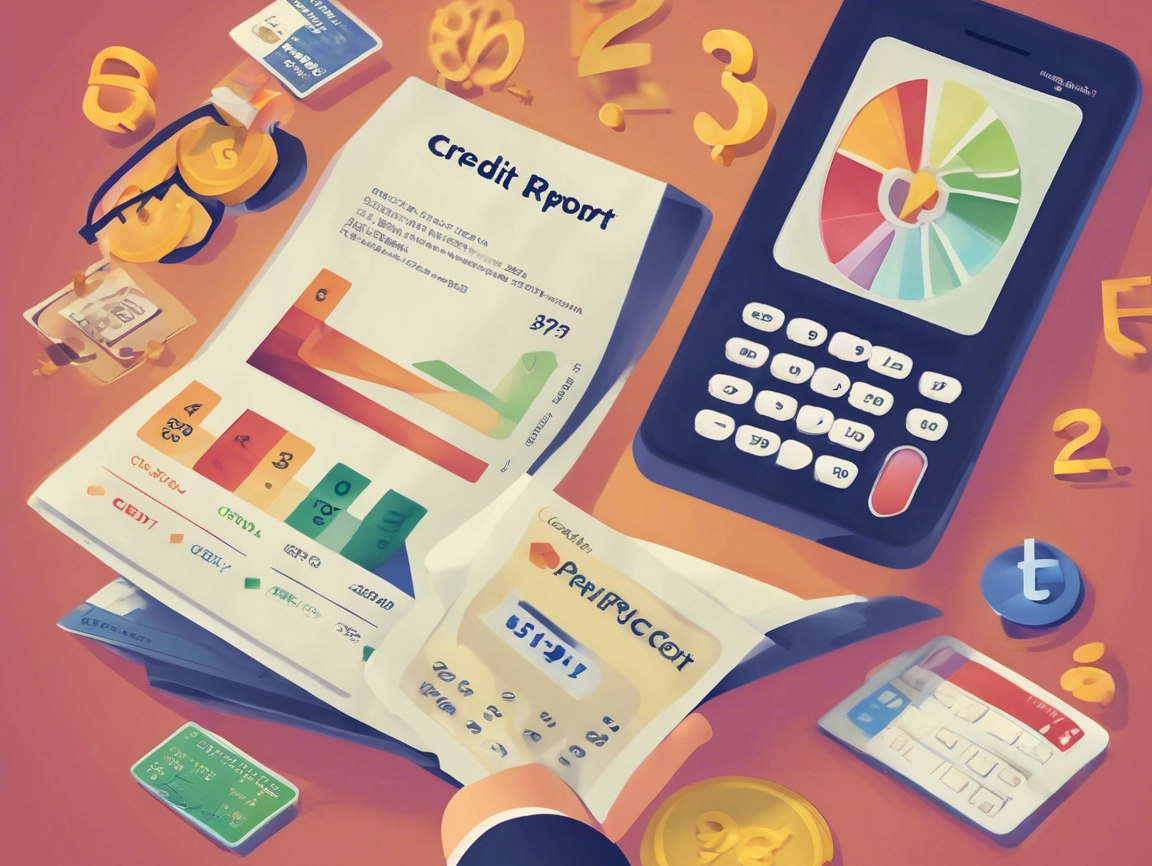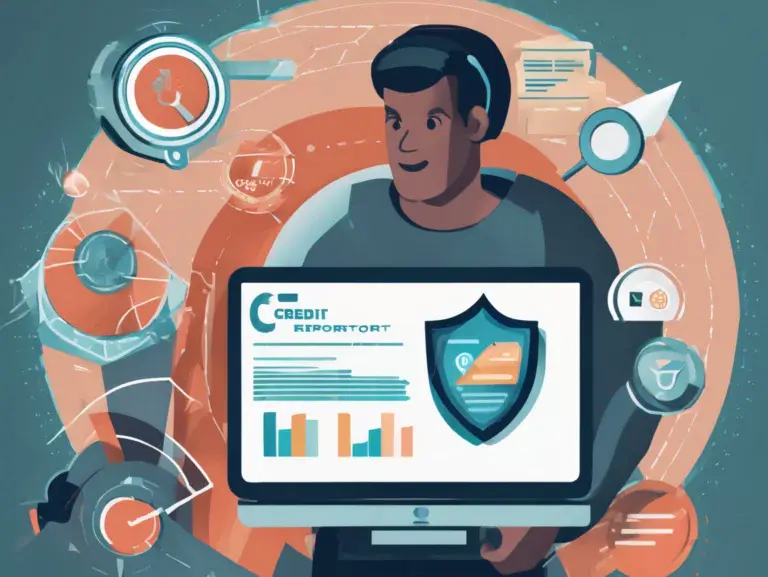Understanding how to monitor your credit score and credit report is crucial for maintaining good financial health. Many consumers have misconceptions about credit monitoring, which can lead to poor financial decisions. For instance, 43% of people believe checking their own credit score negatively impacts it, while in reality, it does not.
Experts like John Ulzheimer and data from CNBC Select reveal that myths about credit monitoring are widespread. For example, 35% of consumers think closing a credit card account hurts their credit score, when it’s actually the credit utilization ratio that matters. These misunderstandings can prevent individuals from making informed decisions about their financial health.

In this article, we’ll debunk key myths surrounding credit monitoring and provide factual insights. You’ll learn how to accurately check your credit score, manage debt, and improve your financial standing. By understanding the truth behind these myths, you can make smarter decisions to secure your financial future.
Understanding Credit Monitoring: The Basics
Credit monitoring is a powerful tool that helps you keep track of your financial behavior and maintain good credit health. It allows you to stay informed about changes in your credit report and score, enabling you to make smarter financial decisions. By monitoring your credit, you can spot errors or fraudulent activities early, protecting your financial standing.
Your credit report is a detailed record of your financial history, including payments, debts, and accounts. It’s used by lenders to assess your reliability. A good credit score, typically ranging from 300 to 900, reflects responsible financial habits. As mentioned by CNBC Select, checking your own credit score is considered a soft inquiry and doesn’t negatively impact it, unlike hard inquiries from lenders.
| Component | Importance | Impact |
|---|---|---|
| Payment History | Shows if you pay bills on time | 35% of your credit score |
| Credit Utilization | Measures debt relative to credit limits | 30% of your credit score |
| Credit Age | Reflects the length of your credit history | 15% of your credit score |
| Credit Mix | Diversity of credit types (cards, loans) | 10% of your credit score |
| New Inquiries | Number of recent credit applications | 10% of your credit score |
Regular credit monitoring offers numerous benefits. It helps you detect identity theft, correct errors on your report, and track your progress toward financial goals. Using free tools and apps, you can easily monitor your credit and maintain a healthy financial profile.

Common Misconceptions About Checking Your Credit Score
Many people worry that checking their credit score will harm their financial standing. However, this is a common misconception. Understanding the difference between types of inquiries and how they affect your score can help you make informed decisions.
Soft Inquiries Versus Hard Inquiries
A soft inquiry occurs when you check your credit score yourself or when a lender preapproves you for a loan. These do not affect your credit score. On the other hand, a hard inquiry happens when you apply for a loan or credit card. Hard inquiries can lower your score because they indicate a potential new debt.
Expert John Ulzheimer explains that soft inquiries are like “window shopping” for credit. They allow you to monitor your financial health without any negative impact.
Why Checking Your Credit Won’t Lower Your Score
Checking your own credit score is considered a soft inquiry and does not harm your credit. In fact, regular monitoring is encouraged to catch errors or fraudulent activities early. This practice helps you maintain a healthy financial profile and make smarter decisions.

Using reputable platforms to check your credit is safe and beneficial. It provides valuable insights without risking your score. Remember, knowledge is power when it comes to your financial health.
Top Myths About Credit Monitoring Busted
Understanding the truth behind common credit monitoring myths can significantly improve your financial health. Let’s explore some widely-held beliefs and separate fact from fiction.
Myth: Carrying a Balance Helps Your Credit
Many believe that keeping a balance on your credit card improves your score. However, this is a misconception. According to experts like John Ulzheimer, carrying a balance doesn’t boost your credit score. What matters most is how you manage your debt. Timely repayments and maintaining low credit utilization are far more beneficial than keeping a balance.
- Aim to keep your credit utilization below 30% to maintain a healthy score.
- Paying off your balance in full each month can improve your credit utilization ratio.
Remember, lenders prefer borrowers who can manage credit without accumulating debt.
Myth: Your Income Influences Your Credit Score
Another common myth is that your income affects your credit score. However, income isn’t a factor in credit score calculations. Your score is based on payment history, credit utilization, and other factors, not your salary.
- Your payment history accounts for 35% of your score.
- Credit utilization makes up 30% of your score.
Focus on building a strong payment history and keeping credit card balances low to improve your score.
By understanding these myths, you can make informed decisions to secure your financial future. Remember, good credit habits and accurate information are key to maintaining a healthy financial profile.
Exploring the Real Impact of Credit Management on Your Financial Health
Managing your credit effectively plays a crucial role in maintaining a healthy financial profile. It’s not just about avoiding debt; it’s about understanding how your daily financial decisions impact your long-term goals. By focusing on key areas like credit card utilization and payment habits, you can take control of your financial well-being.
Understanding Credit Card Utilization and Payment Habits
Credit card utilization is one of the most significant factors affecting your credit score. It measures the amount of debt you carry relative to your credit limits. Keeping this ratio low is essential for maintaining a good credit score. According to data from CNN and CNBC Select, consumers who keep their utilization below 30% tend to have higher scores.
Payment history is another critical component. Timely payments account for 35% of your credit score, making them the most important factor. Late payments can significantly lower your score, so setting up automatic payments can help you stay on track. Additionally, maintaining a long history of on-time payments can positively impact your credit history.
| Factor | Impact on Score | Best Practice |
|---|---|---|
| Credit Utilization | 30% of your score | Keep below 30% |
| Payment History | 35% of your score | Pay on time, every time |
| Credit History | 15% of your score | Maintain long-term accounts |
Lower balances and responsible spending habits lead to improved credit health. By monitoring your credit utilization and ensuring timely payments, you can build a strong financial foundation. Remember, disciplined credit management offers long-term benefits, such as better loan terms and lower interest rates.
Debunking Misconceptions About Credit Reports
When it comes to credit reports, many people have misunderstandings about what’s included and how it impacts their financial health. Understanding the truth about credit reports is essential for making informed decisions.
What Information Really Appears on Your Credit Report
Your credit report includes detailed information about your financial history. This encompasses payment history, accounts, credit inquiries, and public records. However, it doesn’t include your income, employment history, or certain personal details.
- Payment history shows if you pay bills on time.
- Credit accounts include credit cards, loans, and mortgages.
- Inquiries note who has accessed your credit report.
- Public records may include bankruptcies or foreclosures.
TransUnion’s survey reveals that 60% of consumers don’t realize that positive payment history stays on their report indefinitely, while negative marks, like late payments, remain for seven years.
Separating Fact from Fiction in Credit Inquiries
Many believe that all credit inquiries harm their score, but this isn’t true. Soft inquiries, like checking your own credit score, don’t affect it. Hard inquiries, from loan or credit card applications, can lower your score.
| Factor | Impact | Monitoring Tips |
|---|---|---|
| Payment History | 35% of score | Pay on time, every time |
| Credit Utilization | 30% of score | Keep below 30% |
| Credit Age | 15% of score | Maintain long-term accounts |
Regularly reviewing your credit report helps catch errors and fraudulent activities. If you find inaccuracies, dispute them with the credit bureau and provide documentation for correction.
By understanding what’s in your credit report and how it’s used, you can manage your financial health more effectively. Remember, accurate information is key to maintaining a strong credit profile.
The Role of Debt and Payment Habits in Credit Monitoring
Managing debt and maintaining good payment habits are essential for a healthy financial profile. Your credit score reflects how well you handle these aspects. Let’s explore how paying off debt and consistent payments impact your credit score.
How Paying Off Debt Affects Your Credit Score
Paying off debt can have both positive and temporary negative effects on your credit score. For instance, paying off a high-balance credit card can improve your credit utilization ratio, which is 30% of your score. However, closing an old account might shorten your credit history, which accounts for 15% of your score.
According to CNBC Select, paying off installment loans, like mortgages or car loans, doesn’t lower your score. However, closing revolving accounts, like credit cards, can hurt your utilization ratio. The key is to keep credit card balances low and maintain long-term accounts.
Building Healthy Payment Habits
Consistent on-time payments are crucial. Late payments can lower your score, so setting up automatic payments helps. Over time, this builds a positive history, improving your score.
Experts suggest keeping credit card balances below 30% of your limit. Paying off debt reduces utilization, boosting your score. However, sudden score drops can occur if you close old accounts after payoff.
Long-term benefits of smart debt management and regular credit checks are clear. Consistency and awareness are key to maintaining a strong financial profile.
Credit Myths Surrounding Secured Cards and Credit Freezes
When building or rebuilding credit, it’s important to understand the tools available to you. Two common options are secured credit cards and credit freezes. While these can be helpful, there are several myths surrounding their use and effectiveness.
Secured Credit Cards: A Smart Option for Beginners
A secured credit card is a great way to establish or rebuild credit. It requires a refundable security deposit, which becomes your credit line. Despite the myth that secured cards are a last resort, they offer real benefits. For example, they report to all three major credit bureaus, helping you build a positive history. Plus, many secured cards offer cash back rewards and graduate to unsecured cards after responsible use.
Understanding the Limitations of Credit Freezes and Locks
Credit freezes and locks are powerful tools for preventing fraud, but they aren’t a complete solution. A freeze prevents new credit from being opened in your name, but it doesn’t cover all bureaus automatically. You must freeze your credit at each bureau separately. Additionally, a freeze doesn’t affect your existing accounts, so you can still use your cards and loans. While a freeze is free and permanent, it can be inconvenient to lift when you need credit.
| Feature | Secured Credit Cards | Credit Freezes |
|---|---|---|
| Purpose | Build or rebuild credit | Prevent fraud |
| Cost | Usually no annual fee | Free for freezes |
| Impact on Credit Score | Positive if used responsibly | No direct impact |
By understanding how secured cards and credit freezes work, you can make informed decisions about your financial health. Remember, building credit takes time and consistent effort, but the right tools can make the process easier.
Conclusion
Understanding how credit monitoring and proper management affect your financial health is crucial for making informed decisions. Throughout this article, we’ve debunked several common myths, such as the belief that carrying a balance on your credit card improves your score or that checking your credit harms it.
Experts from CNBC Select and other sources emphasize that practices like keeping credit utilization below 30% and making timely payments are key to improving your credit score. Remember, checking your credit using reliable tools is essential and does not lower your score. This practice helps you detect errors and fraudulent activities early.
By applying the practical advice shared here, you can build a strong financial foundation. Stay proactive with credit monitoring and informed about credit myths. Empowered with accurate knowledge, you’ll make smarter financial decisions that secure your future.
FAQ
How does checking my credit report affect my credit score?
Checking your credit report is considered a soft inquiry and does not lower your credit score. It’s a good practice to review your report regularly to ensure accuracy and detect any potential issues early.
What factors impact my credit score the most?
Your payment history and credit utilization are the two most significant factors. Making on-time payments and keeping your credit card balances low relative to your credit limits can positively influence your score.
Can I improve my credit score by paying off debt?
Yes, reducing debt can help improve your credit score. Lowering your credit utilization and paying off high-interest loans can contribute to a healthier financial profile and a better score over time.
How long does it take to see changes in my credit score?
Changes in your credit score can be seen within a few weeks to a few months. Factors like new accounts, payments, and inquiries are typically updated regularly by credit bureaus.
What is the difference between a hard and soft credit inquiry?
A hard inquiry occurs when a lender reviews your credit report for a loan or credit application and can temporarily lower your score. A soft inquiry, such as checking your own credit report, does not affect your score.
How does a secured credit card help build credit?
A secured credit card requires a security deposit and allows you to build or rebuild credit by demonstrating responsible payment habits. It’s a good option for those with limited or poor credit history.
Can a credit freeze prevent identity theft?
Yes, a credit freeze restricts access to your credit report, making it harder for thieves to open fraudulent accounts in your name. However, it does not affect your existing accounts or prevent all types of identity theft.
How does my credit utilization ratio affect my score?
Your credit utilization ratio, or the percentage of available credit you’re using, should ideally be below 30%. High utilization can negatively impact your credit score, so keeping balances low is beneficial.
How often should I check my credit report?
It’s recommended to check your credit report at least once a year from each of the three major credit bureaus. This helps in catching errors or signs of fraud early and maintaining good credit health.












